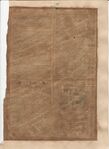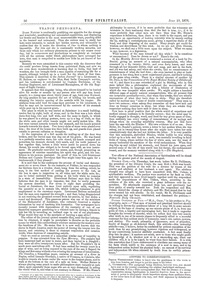Trance Phenomena
Dame Nature is continually gratifying our appetite for the strange and wonderful, manifesting her unbounded capabilities, and displaying her freaks and fancies in the most unaccountable ways, puzzling alike to the learned and unlearned. Thus she entices man to study her laws more intensely, to unlock her hidden secrets, and ultimately to confess that she is under the direction of One to whom nothing is impossible. For this end she is continually working miracles, not those only which her ordinary phenomena present to our senses every day, but in occurrences and productions so completely at variance with all the systems under which philosophers have arranged her laws, that man is compelled to confess how little he yet knows of her mysteries.
Recently we were astonished in this country with the discovery that she could produce living insects from pulverised flints, and now we are even more wonderstruck at learning that in India, that land of wonders, she has brought forth a man capable of sustaining life for a month, although bricked up in a tomb for the whole of that time. This miracle is described in the Indian Journal* by a Lieutenant A. H. Boileau, an engineer in the Hon. East India Company’s service, and his testimony is corroborated by Captain Trevelyan, of the Bombay Engineers, and of Lieutenant Macnaghten, of the 5th Regiment of Light Cavalry.
It appears that this singular being, who allows himself to be buried alive for weeks or months by any person who will pay him handsomely, is a young man about thirty years of age, born near Karnaul. By long practice he has acquired the art of holding his breath, and stopping the interior opening of the nostrils with his tongue. He abstains from solid food for some days previous to his interment, so that he may not be inconvenienced by the contents of his stomach while pent up in his narrow grave.
The place in which he was buried at Jaisulmer is a small building, twelve feet by eight, built of stone, and in the floor was a hole about three feet long, two and half wide, and the same in depth, in which he was placed in a sitting posture, sewn up in a bag of cloth, so that the white ants and other insects might not easily molest him. His feet were turned inwards towards the stomach, and his hands pointed inwards towards his chest. Two heavy slabs of stone were placed over him; the door of the house was then built up, and guards were placed outside to prevent collusion or deception.
At the expiration of a full month the walling up of the door was broken, and the buried man was dug out of his grave. He was found in a perfectly senseless state, his eyes closed, his hands cramped and powerless, his stomach shrunk very much, and his teeth jammed so fast together that, before a little water could be poured down his throat, his mouth was obliged to be forced open with an iron instrument. He gradually recovered his senses, and, though presenting an appearance of extreme emaciation, his spirit was good, and his confidence in his powers unabated. In proof of this, he told Lieutenant Boileau and Captain Trevelyan that they might bury him again for a twelvemonth if they pleased!
It is said that he has undergone the process of burial and disinterment six or seven times. In one instance, at Pokhur, he was suspended for thirteen days in a wooden chest, hung from the ceiling, which, he says, is the best method of putting his powers to the test, as the box is open to inspection on all sides, and the white ants, &c., can be better excluded from getting at his body while he remains in a state of insensibility. Lieutenant Boileau says that he fully believes that the man is no impostor, but that he really possesses the powers described. For seven or eight days preceding the burial at Jaisulmer, the man lived entirely upon milk, regulating the quantity so as to sustain life, whilst nothing remained to give employment to the excretory organs. Lieutenant Boileau understood that the man soon regained his strength; and that, being disappointed in not receiving the promised reward from his patron, he had stolen a camel and decamped. This generous patron was one of the ministers of the Muharawul of Jaisulmer, who certainly deserved a similar inhumation by way of teaching him humanity. Our newspapers have recently teemed with deprecations of the enormity of one of our theatrical managers pandering to a vitiated taste by hiring a female to risk her life by ascending an inclined rope in one of our playhouses. What would they say to the spectacle of burying a man alive?
The editor of the journal quoted remarks that, until further information be obtained, it might be precipitate to theorise on the probable means by which this extraordinary creature maintains the mastery over the functions of life. He states that it is now well known that the slaves in South America exert the power of forcing the tongue into the larynx, and retaining it there to obstruct respiration and occasion death, when desirous of committing suicide.
Once we read an account of a somewhat similar case of torpidity in puppies. It was extracted from the Tyne Mercury. The puppies had been immersed half an hour in water, and then buried in a dunghill; they were all alive twenty-two hours after. But Dr. Franklin’s fly is much more marvellous still. It had been soaked for twenty years in a pipe of wine, and on being exposed to the rays of the sun it flapped its wings and flew away without even evincing the symptoms of intoxication. The Omnibus, a Neapolitan paper, contains an account of a diver in Naples, called Lorenzo Giordano, a native of Fiumara, in Calabria, who is able to remain six hours under the water in the deepest places, and to walk at the bottom at the rate of a mile an hour. Mother Nature is always playing some prank to make philosophers stare vacantly at each other, more especially those sages who are so very dictatorial in telling the world what is, and what is not contrary to Nature. If Mr. Hume’s philosophy be correct, if it be more probable that the witnesses are mistaken in their testimony than that the fact is true, i.e., if it be more probable that other men are liars than that Mr. Hume’s experience is fallacious, then there is no truth in the report, and you may have an opportunity of looking tolerably wise by merely curling the lip, making a contemptuous sneer, giving a sagacious shake of the head, and thus disposing of the matter. Many people get credit for wisdom and shrewdness by this trick. As we are not ultra liberals, however, we shall say a little more upon the subject. What we mean to say, however, is a digression.
What becomes of the man himself all this while? Is he conscious or unconscious? Does he dream or not? There’s the rub.
In the Monthly Review there is contained a review of a book by Dr. Bendel, giving an account of a natural somnambulist, who often remained in a fit, twenty, thirty, and even forty hours, and went through all her domestic duties, read and sang, and saw in the dark, and yet was fast asleep, and when she awoke, had no consciousness or remembrance of what she had done; she even learned to play at backgammon in her sleep, beat a most experienced player, and knew nothing of the game when awake. There is a similar account of another by Dr. Dyce, in the Transactions of the Royal Medical Society of Edinburgh, vol. 9; and there is a case recorded of a girl in Stirling, who in this state talked like a philosopher, explained the movements of the heavenly bodies, in language and with a felicity of illustration of which she was incapable when awake. We might adduce a hundred different cases of merely natural somnambulists, who all present this one invariable peculiarity—viz., that when they awake, they are utterly unconscious of what they have done in sleep. They are therefore called by medical men “cases of double consciousness.” They seem to have two natures; when asleep they remember all they have said and done on former occasions in sleep, but when they are awake they remember nothing they have said or done in sleep.
Now here is proof positive that the whole world of experience and medical science confesses to be literally correct; that the mind may be busily engaged in thought, word, and deed for any given space of time, then suddenly lose every vestige of remembrance of its sayings and doings when its everyday sensibility returns. May not this have been the case with the Hindoo? His own evidence is of no use. Jane Rider, Dr. Bendel’s patient, wrote a letter to her mother when she was asleep, yet in twenty-four hours after she might have taken her oath conscientiously that she had not written the letter. It is very possible that this miserable, shrivelled Hindoo, whilst bodily he was sitting coiled up in a hole and tied in a sack, was mentally revelling in fairy fields of vision, where neither the fear of white ants, nor the want of money beclouded the sunshine of the vivid enchantment. When they dug him up and rubbed his stomach, and forced his jaws open, and poured some of the life of this world into his throat, the enchantment ceased, and the memory vanished along with it.—The Shepherd.
* Account of a man who submitted to be buried alive for a month at Jaisulmer, in the East Indies, and who was dug out alive at the expiration of that period. Abridged from the Indian Journal of Medical and Physical Science, Calcutta, 1836.
Answers to Correspondents
...
<Untitled> (The Government in India Have ....)
...
<Untitled>
...
Editor's notes
Sources
-
London Spiritualist, No. 308, July 19, 1878, p. 36


